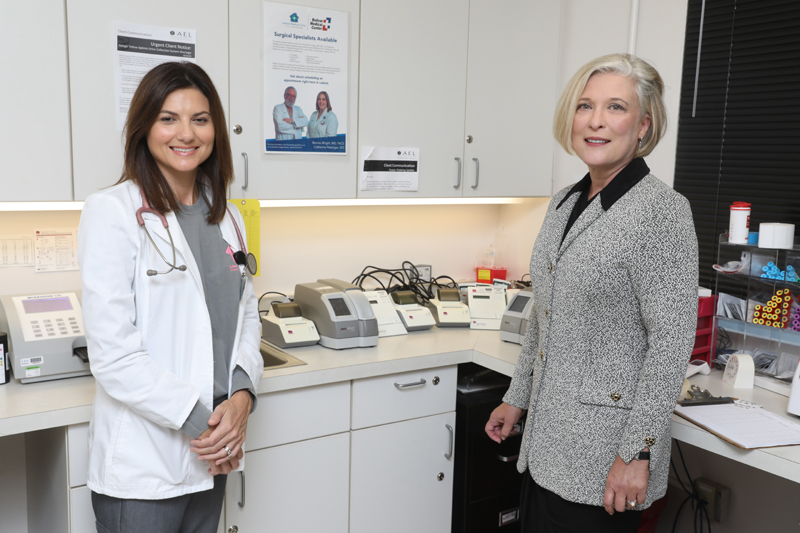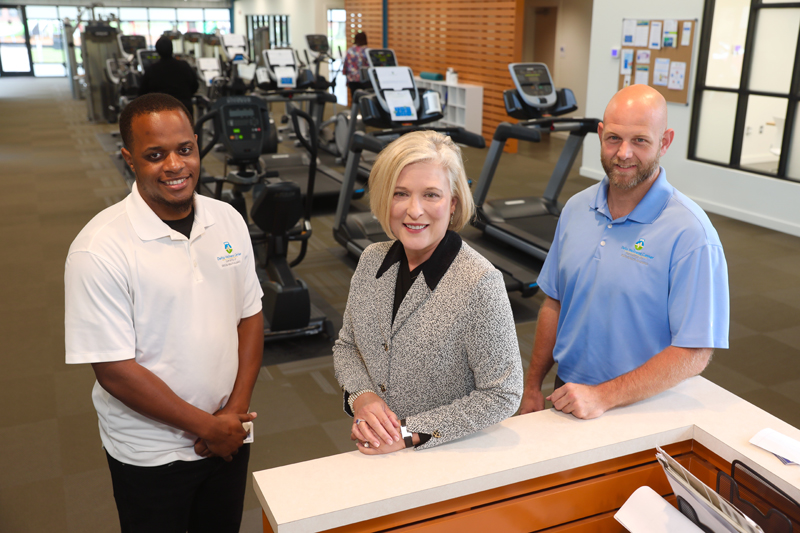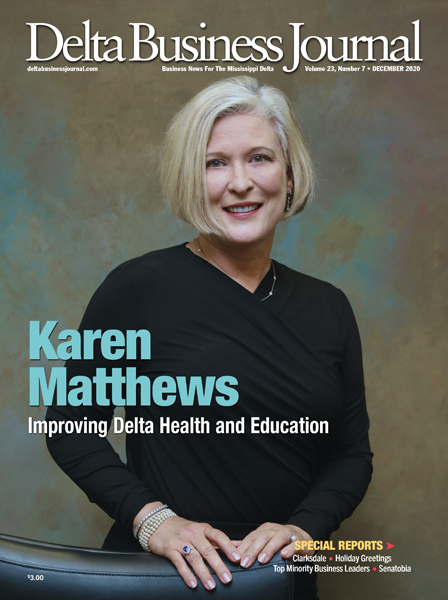Improving Delta Health and Education
By Becky Gillette • Photography by Johnny Jennings
The coronavirus disease-2019 (COVID-19) has taken a devastating toll on the people of the Mississippi Delta. One of the most heartbreaking aspects of the pandemic is how it impacts those with underlying health issues more than healthy folks, says Karen Comer Matthews, Ph.D., president and CEO of Delta Health Alliance (DHA), a non-profit, community-based organization that funds and operates forty different healthcare and education initiatives in thirty-eight Mississippi Delta counties.
Many Delta residents live with chronic illnesses such as diabetes and high blood pressure stemming from obesity and poor nutrition. These are the health disparities that DHA has been working to improve through education and prevention programs.
“We have so many success stories and data that show how effective these programs have been in people’s everyday lives,” Matthews says. “As an organization, we’re always asking ourselves how we can improve the quality of health in our communities so that our residents are better able to weather storms such as this current health crisis.”
COVID-19 has not only added urgency, but has altered the way in which DHA operates.
“In many ways, this pandemic has made us a stronger organization,” Matthews says. “There is no better staff of employees than those of DHA. They are all heroes in my book.”
She also attributes a large part of its success to active engagement by the communities served. For instance, Promise Communities use a pipeline of programs which have been designed and maintained with help from area residents to guide children from low-income families from the cradle to successful careers.
“These programs work together to meet the needs of children as they age, working in cooperation with existing resources in the community,” Matthews says. “Likewise, our Parents as Teachers program engages with new parents to provide regular home visits, educational programs, supplies and support provided by trained case workers who have been recruited and hired directly from the communities they serve.
“Similarly, our Medicaid demonstration project works in partnership with local doctors to use population health management tools driven by their electronic health record systems to reduce pre-term births and to decrease the number of patients who develop diabetes.”
Across the country, there was been a major shift to telemedicine during the pandemic. But that has been a challenge in rural parts of Mississippi because many don’t have access to broadband.
DHA has been working to bring telehealth technologies to underserved communities since before Y2K.
“DHA is passionate about the potential these technologies offer to improve timely access to care for rural communities, while also streamlining efficiencies for rural providers,” Matthews says. “Our communities’ lack of access to reliable, affordable broadband has been an ongoing concern. The advancements in 4G and 5G networks are often meaningless to rural communities that struggle with even the most basic of connections. During the pandemic, we’ve seen children who walk to their closed schools or libraries to access the internet, having no ability to connect from home. And even when high-speed broadband is available, it’s too costly for most of our families, a third of whom live below the federal poverty level.”
DHA has addressed the broadband problem several ways. They’ve opened three free-use community centers with high-speed internet in rural communities that follow all CDC guidelines for distancing and safety. For telehealth appointments, DHA’s Leland Medical Clinic provides patients with a mobile hotspot and a secure tablet with a built-in webcam and microphone that can be cleaned and disinfected before being reassigned to a new patient.
Matthews considers one of the highest priorities in her job to be getting the world to see the Mississippi Delta—to recognize the issues in the Delta and to help support DHA work to build a new generation of people who believe in themselves and each other.
“My job is to hold a mirror up to ourselves with data and with actual facts that help guide us and shows the world that we are an organization worth investing in,” Matthews says.
What she likes most about her work is seeing people’s lives changed for the better.
“I love working with our community partners who are so committed to their cities and towns and neighborhoods,” Matthews says. “I love working with our staff who are so dedicated, creative and hardworking. They care about the Delta because they are part of the Delta and they understand the challenges. And I love watching these young people who have been involved in various DHA programs such as Youth Council venture out on their own to make successful lives.”
Matthews has been well received by other Delta leaders. Sunflower County Supervisor Glenn M. Donald says Matthews is one of the most respectable and compassionate people he has ever met.
“I met her about eight years ago in her work as an advocate for education,” Donald says. “Karen helped get some grant money for an advocate process, and brought in different specialties. Our school district was failing, but because of DHA and the Indianola Promise Community program, we are passing now. DHA makes it so our children don’t get behind.”
Donald says DHA also has obtained grants to provide daycare at churches so parents can continue to work. Internet has been provided at the churches for children to have access to internet learning.
“If Karen was running for president of U.S., I would vote for her,” Donald says. “She has done a lot for our schools and the community.”
Matthews was born and reared in Fulton where she attended the Itawamba Agricultural High School. She earned a B.S. in engineering and a master’s degree in business administration before taking a job with Ernst and Young working with St. Jude Children’s Research Hospital. Initially she wasn’t too crazy about the prospect of working in healthcare.

Heather Lloyd, family nurse practitioner with Matthews touring the Leland Medical Clinic. 
Shelby, Karen and Olivi Matthews at The Grove in Oxford. 
Kendarius Moore, Matthews and Myles Grubb in the new Delta Wellness Center located behind the Leland Medical Clinic.
“But after just a week, I began to ask myself what I could do to make a difference, perhaps how technology could improve healthcare and the lives of patients,” Matthews says. “Then I was hooked. I finished my Ph.D. at the University of Tennessee while working, and decided to make a career in healthcare. We all make choices in our lives that we look back on and say, ‘This was the best decision I ever made. That’s how I feel about my career.”
Prior to joining DHA, Karen served as associate dean of the College of Medicine and vice chancellor at the University of Tennessee Health Science Center. While there, she was an early leader in establishing telemedicine networks.
Matthews had several mentors or role models who made a particularly strong impression on her.
“Manny Martins, who created TennCare in Tennessee, taught me so very much about administration, and believed in me and promoted me when women in positions of responsibility in the workplace were not the norm,” Matthews says. “Barbara Nixon, who ran the First Years Institute, helped introduce me to the Harlem Children’s Zone, Dolly Parton’s Imagination Library and Universal Parenting. She has been a role model for what strong women can accomplish. Dr. Henry Herrod brought me into the College of Medicine at the University of Tennessee, and allowed me to start this then-new and crazy thing called telemedicine, and helped me envision data-driven accountability before it was popular. I can never repay them for believing in me.”
She also is grateful to the late Sen. Thad Cochran, who funded this novel idea called DHA. She says that allowed her to come home and work to help improve health and education.
Her parents are retired educators who still live in Fulton. Her parents, sister, children and extended family bond over attending Ole Miss sporting events, a family tradition since before she was born. Her daughter, Shelby, is in San Diego enjoying working as an analyst and spending time outdoors. Daughter Olivia is a senior at Ole Miss and is interviewing for medical school.
“I am so proud of them both,” Matthews says.
For recreation, she enjoys catching up with girlfriends by walking and doing Pilates together.
“For me, sports are a way to both get exercise and be with friends,” she says. “I love being on or in the water as much as possible. I love to travel, to see new places and meet and experience new people. The pandemic has put a crimp in those endeavors, but it will end one day and we will all get back to the things we enjoy.”
Outside of DHA, she works with the Mississippi Economic Council, the Ole Miss Engineering Board, the American Lung Association, the American Diabetes Association, the Memphis Library Foundation Board and the Goodwyn Institute. This year she received the Catherine Stuart Schmoker Principled Leadership Award for contributions to her community and state.
“Finally, but most important, I am very active with my church, Idlewild Presbyterian, which has been such an important part of my family’s life,” Matthews says.
Matthews has served as principal investigator on numerous state and federal research projects and has authored more than fifty articles for peer-reviewed academic journals.

